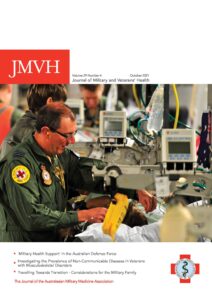Editorial – Guest Editorial – Air Marshal Mel Hupfield, AO, DSC, Chief of Air Force
Congratulations to the Journal of Military and Veteran Health reaching its 30 year milestone. In this auspicious year, the Royal Australian Air Force celebrates its 100th birthday and it is my pleasure to pen a short editorial for your next edition. In the year of the centenary of the Royal Australian Air Force we celebrate… Read more »




 Download the whole edition here.
Download the whole edition here.


